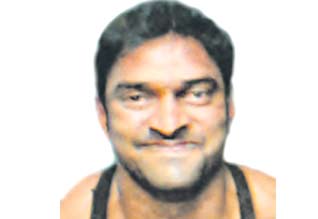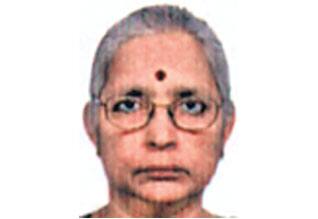[TamilNet, Wednesday, 21 March 2012, 20:54 GMT]
Stating that oppressed nations must enforce their own agendas and not rely on NGOs like ICG for solutions, Kurdish activist in UK, Mehmet Aksoy, argued that such NGOs were entrenched in bureaucracies, at a seminar on ‘State Repression and the Struggle for Self-determination: Strategies for Resistance’ organized by Campaign against Criminalising Communities (CAMPACC) on Sunday. The meeting at the University of London Union, London was held in association with diaspora organizations of Kurds, Balochs, Eezham Tamils, Basques, and Sindhis. The Eezham Tamil activists spoke about how the double standards in dealing with the Tamils deployed by the western governments gave a green signal for the GoSL to carry out its genocidal offensive in May 2009.
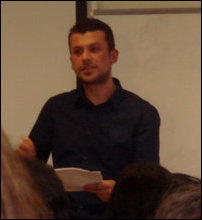
Mehmet Aksoy, Halkevi Kurdish Turkish Community Centre
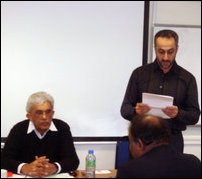
[R-L] Hyrbyair Marri, Baloch Political leader and Saleh Mamon, Chair
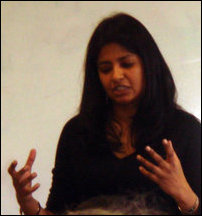
Janani Jananayagam, TAG
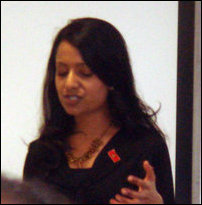
Sivagami Rajamanoharan, TYO-UK
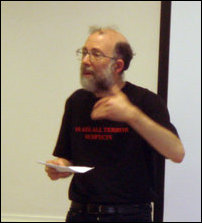
Les Levidow, CAMPACC
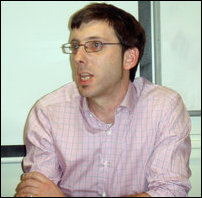
Oier Imaz, Basque activist with the Abertzale Left
The diaspora activists talked about the respective histories of their struggle, the nuances of geo-politics in their specific cases as well as their experiences in dealing with establishments.
The meeting, chaired by Saleh Mamon of CAMPACC, comprising diaspora activists of various nations without states emphasised on the need of building solidarities among such groups especially in the UK and also on the imperative to conceive new resistance strategies to tackle repressive laws in the UK.
Les Levidow of CAMPACC said that beyond the colonial measures of counterinsurgency, the EU has also devised ways to create a stigma of ‘supporter of terrorism’ among oppressed nations here. Noting how refugees have been prosecuted and deported for supporting so called terrorist organizations, he said that there is “a securitization agenda which turns all political conflicts into security issues.”
Referring to David Miliband’s observations in the recently released Channel 4 documentary, he also said that there was an asymmetric labelling of one side as terrorists while the other side was committing genocide.
In the discussion that followed, the Chair Saleh Mamon noted that the counterinsurgency model followed by Sri Lanka, Turkey and Pakistan was the US model.
Talking about how the GoSL was attempting to erase the Eezham Tamil identity, Jan Jananayagam, UK spokesperson for TAG, said that how people in the Tamil homelands were reduced to life at a bare minimum, where struggling to stay alive was made to be the only priority. She referred to double standards in governments of US and Canada where the first prosecutions were not of war criminals but of students who sent computer equipment to Vanni. She also pointed out that what came out in the Channel 4 documentaries were already put across to the world from journalists on the ground much earlier, but the world failed to act.
Sivakami Rajamanohar of the TYO-UK opined that the fact that the LTTE was banned in the western states and the Tamil nation was criminalized for standing by their demands led to the genocidal offensive in 2009. “Although the Sri Lankan government claims peace now, the fact that genocide is ongoing tilts the balance in our favour,” she said.
Ali Has, Kurdish lawyer and Higher Court Advocate practicing Human Rights and Criminal Law in London, talked about the history of the Kurdish struggle for independence and the violent repression of the PKK led movement by the Turkish state. He also spoke about the draconian anti-terror laws in Turkey and how the 1982 Turkish constitution made any demand for Kurdish independence or even autonomy illegal.
Mehmet Aksoy, from the Halkevi Kurdish Turkish Community Centre, spoke on how the Kurdish movement worked with Turkish leftist leaders outside Turkey and with other socialist movements in the western countries. Referring to repression in Turkey, he stated that every time the Turkish appeared as giving a solution, it would combine it with mass arrests. He also elaborated on how Kurdish paramilitaries were used by Turkey to dissipate the movement in Kurdish regions.
When a question was raised during the discussion following the presentations on the role of groups like ICG which talk only about human rights without addressing political demands, with reference to Eezham Tamils and Kurds where the popular demand for sovereignty is painted as extremist by such groups, Mr. Aksoy said that such organizations are tied to bureaucracies of the west and that they should be worked with tactically without expecting too much from them.
“The disease of liberalism will always pull you back making you expect solutions from such organizations. But if you do not enforce your agenda, you will never get a true freedom,” he said.
Oier Imaz, a Basque activist affiliated to the Abertzale Left, talked about the experiences of the Basque struggle and emphasised that a creation of counter-power dynamics, even while working within the system, should be part of our daily agenda.
Baloch political leader Hyrbyair Marri and Baloch human rights activist Dr. Shahzavar Karimzadi spoke about the history of the Baloch movement and of the various human rights abuses by Pakistan. Both opined that a free and democratic Balochistan alone will bring a lasting peace in the region.
Towards the end of the seminar Mr. Levidow proposed that there should be an organized opposition to draconian anti-terror laws in the UK and to prosecution or extradition of refugees in the name of countering terrorism.
 மனித உரிமைகள் பேரவையில் இலங்கை தொடர்பான பிரேரணை நேற்று நிறைவேற்றப்பட்டதன் பின்னர் இலங்கை மனித உரிமைகள் பாதுகாவலர்களுக்கு எதிரான பழிவாங்கல் நடவடிக்கைகள் இடம்பெறக்கூடாதென ஐ.நா. மனித உரிமைகள் உயர் ஸ்தானிகர் நவநீதம்பிள்ளை எச்சரித்துள்ளார்.
மனித உரிமைகள் பேரவையில் இலங்கை தொடர்பான பிரேரணை நேற்று நிறைவேற்றப்பட்டதன் பின்னர் இலங்கை மனித உரிமைகள் பாதுகாவலர்களுக்கு எதிரான பழிவாங்கல் நடவடிக்கைகள் இடம்பெறக்கூடாதென ஐ.நா. மனித உரிமைகள் உயர் ஸ்தானிகர் நவநீதம்பிள்ளை எச்சரித்துள்ளார்.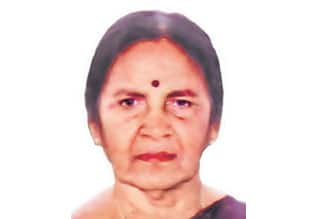
 விஜயகாந்திற்கு கருத்துசொல்ல எந்த அருகதையும் கிடையாது
விஜயகாந்திற்கு கருத்துசொல்ல எந்த அருகதையும் கிடையாது 
